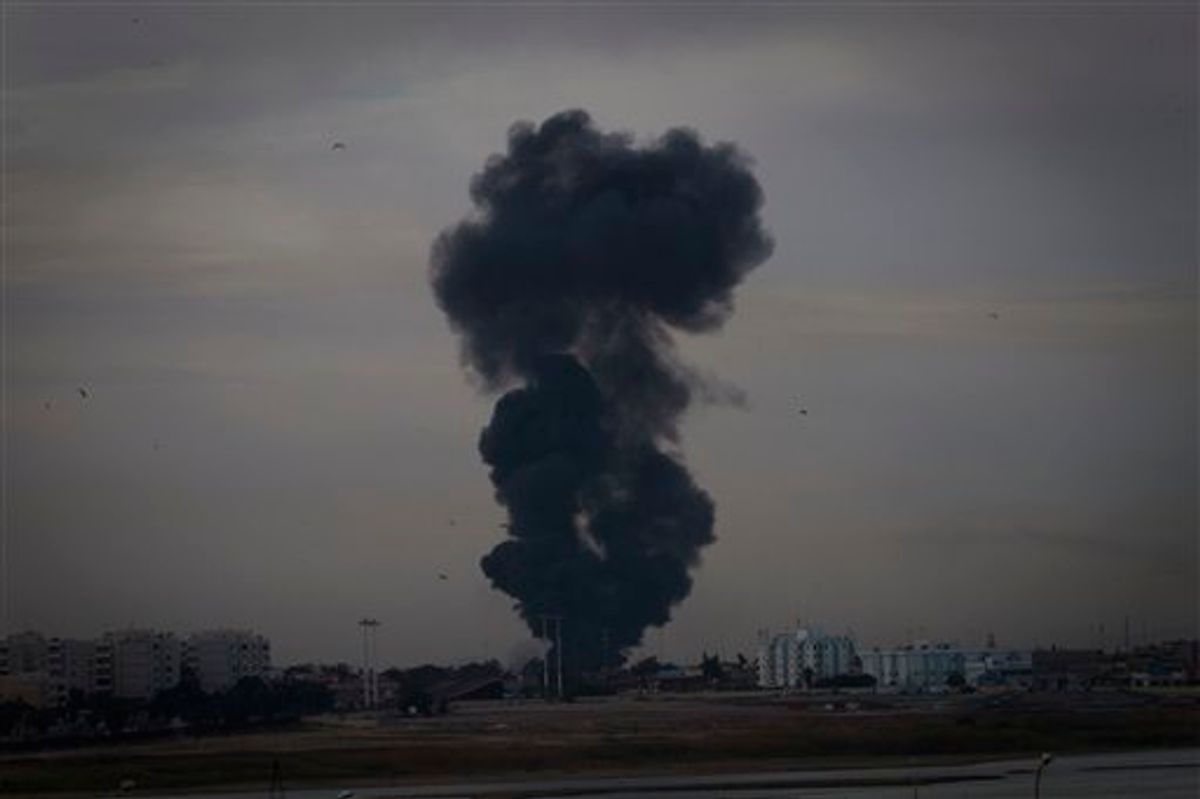Moammar Gadhafi took advantage of international indecision to attack the heart of the 5-week-old uprising on Saturday, sending troops, tanks and warplanes to swarm the first city seized by the rebels. Crashing shells shook buildings, and the sounds of battle drew closer to Benghazi's center.
"Where is France, where is NATO?" cried a 50-year-old woman in Benghazi. "It's too late."
Leaders from the Arab world, the United States and other Western powers are holding urgent talks in Paris over possible military action, and France's ambassador to the United Nations, Gerard Araud, told BBC Newsnight that he expected military action to begin within hours of the meeting. In an open letter, Gadafhi warned: "You will regret it if you dare to intervene in our country."
On Saturday, a warplane was shot down over the outskirts of Benghazi, sending up a massive black cloud of smoke. An Associated Press reporter saw the plane go down in flames and heard the sound of artillery and crackling gunfire.
Before the plane went down, journalists heard what appeared to be airstrikes from it. Rebels cheered and celebrated at the crash, though the government denied a plane had gone down -- or that any towns were shelled on Saturday.
The fighting galvanized the people of Benghazi, with young men collecting bottles to make gasoline bombs. Some residents dragged bed frames and metal scraps into the streets to make roadblocks.
Abdel-Hafez, a 49-year-old Benghazi resident, said rebels and government soldiers were fighting on a university campus on the south side of the city, with government tanks moving in, followed by ground troops. In the city center, tank fire drew closer and rebel shouts rang out.
At a news conference in the capital, Tripoli, the government spokesman read letters from Gadhafi to President Barack Obama and others involved in the international effort.
"Libya is not yours. Libya is for the Libyans. The Security Council resolution is invalid," he said in the letter to French President Nicolas Sarkozy, British Prime Minister David Cameron, and U.N. Secretary-General Ban Ki-Moon.
To Obama, the Libyan leader was slightly more conciliatory: "If you had found them taking over American cities with armed force, tell me what you would do."
Government spokesman Moussa Ibrahim said the rebels are the ones breaking the cease fire by attacking military forces.
"Our armed forces continue to retreat and hide, but the rebels keep shelling us and provoking us," Musa told The Associated Press.
In a joint statement to Gadhafi late Friday, the United States, Britain and France -- backed by unspecified Arab countries -- called on Gadhafi to end his troops' advance toward Benghazi and pull them out of the cities of Misrata, Ajdabiya and Zawiya. It also called for the restoration of water, electricity and gas services in all areas. It said Libyans must be able to receive humanitarian aid or the "international community will make him suffer the consequences" with military action.
Parts of eastern Libya, where the once-confident rebels this week found their hold slipping, erupted into celebration at the passage of the U.N. resolution. But the timing and consequences of any international military action remained unclear.
Misrata, Libya's third-largest city and the last held by rebels in the west, came under sustained assault well after the cease-fire announcement, according to rebels and a doctor there. The doctor, who spoke on condition of anonymity because he feared reprisals, said Gadhafi's snipers were on rooftops and his forces were searching homes for rebels.
Foreign Minister Moussa Koussa said that Libyan officials had informed the U.N. and the Security Council that the government was holding to the cease-fire and called for a team of foreign observers to verify that.
"The nation is respecting all the commitments put on it by the international community," he said, leaving the podium before answering any questions about Benghazi.
In the course of the rebellion, Libya has gone from a once-promising economy with the largest proven oil reserves in Africa to a country in turmoil. The foreign workers that underpinned the oil industry have fled; production and exports have all but ground to a halt; and its currency is down 30 percent in just two weeks.
Al-Shalchi contributed to this report from Tripoli, Libya.



Shares